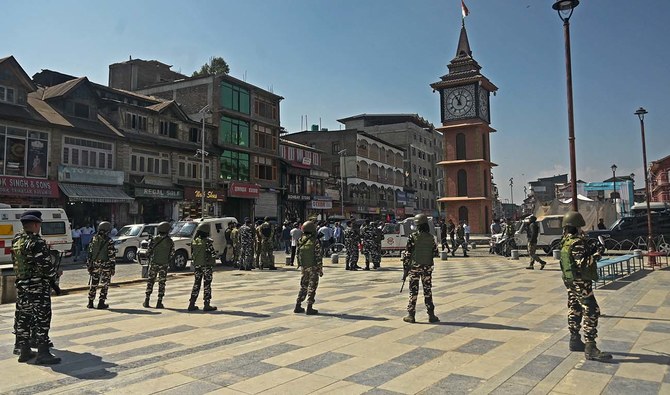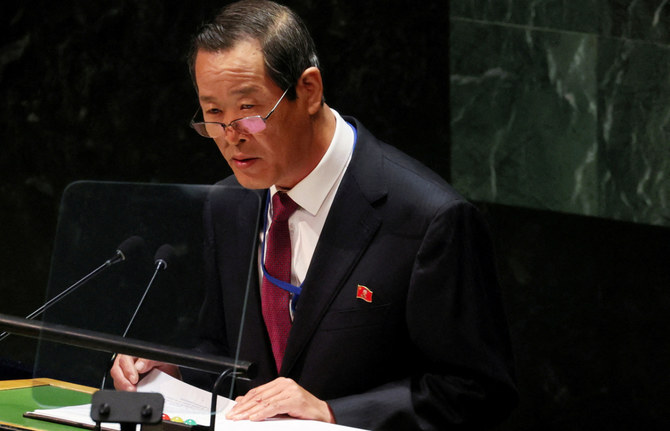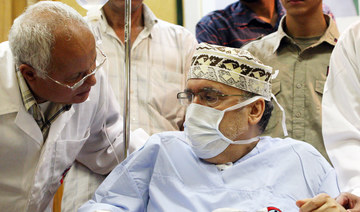EDINBURGH: Five judges at Scotland’s highest court of criminal appeal on Friday upheld the conviction of the only man found guilty of the 1988 Lockerbie bombing after a posthumous legal challenge.
The family of former Libyan intelligence officer Abdelbaset Ali Mohmet Al-Megrahi, which brought the case, said they were “heartbroken” at the decision, their lawyer Aamer Anwar said.
They will apply to appeal to the UK Supreme Court within 14 days, he added.
The ruling at the High Court of Justiciary in Edinburgh comes just over 32 years after what remains Britain’s worst terrorist attack, with long-held doubts about Megrahi’s involvement.
Megrahi spent seven years in a Scottish prison after his conviction in 2001 for the mass murder of 270 people, when Pan Am Flight 103 blew up over the Scottish town on December 21, 1988.
The Libyan regime of Muammar Qaddafi officially acknowledged responsibility in 2003, and paid $2.7 billion in compensation to families of the victims.
Megrahi was released and returned to Libya in 2009 after being diagnosed with terminal cancer. He died in 2012, protesting his innocence.
An initial appeal against his conviction and sentence was rejected, while a second was abandoned after his diagnosis.
Anwar said Megrahi’s son Ali and the family would still fight to quash the conviction.
“All the Megrahi family want for Scotland is peace and justice, but as Ali stated today their journey is not over, Libya has suffered enough, as has family for the crime of Lockerbie, they remain determined to fight for justice,” he said.
The family wants the British authorities to declassify documents that are said to allege that Iran used a Syria-based Palestinian proxy to build the bomb that downed the Boeing 747.
The documents are thought to allege a Jordanian intelligence agent within the Popular Front for the Liberation of Palestine-General Command (PFLP-GC) built the bomb.
The PFLP-GC has been designated a terrorist group by several countries, including Britain and the United States.
The Lockerbie bombing is alleged to have been carried out in retaliation for the downing of an Iranian passenger jet by a US Navy missile in July 1988 that killed 290 people.
The case came back to court in November last year after an independent criminal case review body said a possible miscarriage of justice may have occurred on the grounds of “unreasonable verdict” and non-disclosure of evidence.
But the judges rejected both grounds of appeal.
“The appeal against conviction is refused,” they said in a 64-page ruling.
Central to his family’s case was the testimony of Tony Gauci, a Maltese shopkeeper, who identified Megrahi as the man who bought clothes found in the suitcase that contained the bomb.
Lawyers argued his eye-witness evidence should have been discounted and was “highly prejudicial” because he had earlier seen a photograph of Megrahi as a suspect in a newspaper.
They said Gauci was motivated by reward money, that there was no proof Megrahi bought the clothing, and that dates of his supposed visit to Malta did not fit the timeline.
The suitcase was loaded onto a plane from Malta to Germany, then transferred to the ill-fated flight that left London Heathrow bound for New York.
The government’s case was that Megrahi used a false passport to travel to the Mediterranean island, and that Gauci did not receive any remuneration.
Crown lawyers said the three judges who tried and convicted Megrahi were entitled to infer he was involved, and the fake document was part of a “significant chapter of evidence” supporting that.
On the 32nd anniversary of the Lockerbie bombing in December, the US Justice Department announced a new indictment against another former member of Qaddafi’s intelligence services.
It alleges that Abu Agila Mohammad Masud assembled and programmed the bomb.
The investigation was relaunched in 2016 when Washington learned of his arrest after Qaddafi’s ouster and death in 2011, and his reported confession of involvement to the new Libyan regime in 2012.
Investigators also relied on his travel records, including a flight from the Libyan capital Tripoli to Malta.
Masud is currently being held in Libya for his alleged involvement in a 1986 attack on a Berlin nightclub that killed two US soldiers and a Turkish citizen.
Tripoli in 2004 also agreed to compensate the families of the victims of that attack.
Scottish court upholds Lockerbie bomber’s conviction
https://arab.news/5jvk4
Scottish court upholds Lockerbie bomber’s conviction

- Ruling at the High Court of Justiciary in Edinburgh comes just over 32 years after what remains Britain’s worst terrorist attack
Suspected Kashmir rebels kill Indian air force corporal

- Suspected rebels ambushed military convoy in Indian-administered Kashmir, Indian Air Force says
- Since 1989, rebel groups opposed to Indian rule have waged insurgency in disputed territory
SRINAGAR, India: An Indian air force member was killed and four more injured when suspected rebels ambushed a military convoy in Indian-administered Kashmir, an official statement said, as campaigning for national elections continues in the disputed territory.
The convoy was attacked by an unknown number of armed militants who sprayed automatic rifle fire toward at least one air force truck in the mountainous Poonch area, 200 kilometers (124 miles) south of the main city of Srinagar, the air force said in a statement.
Five air force personnel were hit in the firefight late Saturday and “one Air Warrior succumbed to his injuries later,” it said, identifying the dead man as a corporal.
A neighboring constituency took part in the first phase of India’s general election on April 19, and Poonch voters were originally scheduled to cast their ballots this week but the Election Commission of India has postponed the polling to May 25 because of inclement weather in recent days.
Kashmir has been divided between India and Pakistan since their independence in 1947, with both claiming the high-altitude territory in full but administering it in parts.
Since 1989, rebel groups opposed to Indian rule have waged an insurgency in Indian-controlled Kashmir, demanding either independence or a merger with Pakistan.
The conflict has left tens of thousands of civilians, soldiers and militants dead.
Rebel activity in the territory has registered an uptick since last month as campaigning for the elections picked up in the restive region.
In April, three suspected rebels were killed and a police officer and three soldiers wounded in three separate clashes across the territory.
Violence has drastically dropped since 2019, when Prime Minister Narendra Modi’s government revoked the region’s limited autonomy and stepped up a security chokehold.
Voting in India’s six-week-long national election, which started last month, will end on June 1.
Driver dies after crashing into White House perimeter gate, Secret Service says

- The driver was not immediately identified
WASHINGTON: A driver died after crashing a vehicle into a gate at the White House Saturday night, authorities said.
The driver was found dead in the vehicle following the crash shortly before 10:30 p.m. at an outer perimeter gate of the White House complex, the US Secret Service said in a statement.
Security protocols were implemented but there was no threat to the White House, the agency said.
The driver was not immediately identified.
The Secret Service will continue to investigate the matter, while turning over the fatal crash portion of the investigation to the Washington Metropolitan Police Department, the agency said.
Fake videos of Modi aides trigger political showdown in India election

- Indian police arrest nine people for circulating fake video of Indian Home Minister Amit Shah
- With more than 800 million Internet users, tackling misinformation in India is a huge challenge
BENGALURU/LUCKNOW: Manipulated videos are taking center stage as campaigning heats up in India’s election, with fake clips involving two top aides of Prime Minister Narendra Modi triggering police investigations and the arrest of some workers of his rival Congress party.
In what has been dubbed as India’s first AI election, Modi said last week fake voices were being used to purportedly show leaders making “statements that we have never even thought of,” calling it a conspiracy “to create tension in society.”
Indian police — already investigating the spread of fake videos showing Bollywood actors criticizing Modi — are now investigating a doctored online clip that showed federal home minister Amit Shah saying the ruling Bharatiya Janata Party will stop certain social guarantees for minorities, a subject sensitive for millions of voters.
Shah retorted on X, posting his “original” and the edited “fake” speech and alleging — without providing any evidence — that the main opposition Congress was behind the video it created to mislead the public. The minister said “directions have been issued to the police to address this issue.”
Indian police arrested at least nine people, including six members of Congress’ social media teams, in the states of Assam, Gujarat, Telangana and New Delhi last week for circulating the fake video, according to police statements.
Five of the Congress workers were released on bail, but the most high-profile arrest made by the cybercrime unit of New Delhi police came on Friday, when they detained a Congress national social media coordinator, Arun Reddy, for sharing the video. New Delhi is one region where Shah’s ministry directly controls police. Reddy has been sent into three-day custody.
The arrest has sparked protests from Congress workers with many posting on X using the #ReleaseArunReddy tag. Congress lawmaker Manickam Tagore said the arrest was an example of “authoritarian misuse of power by the regime.”
Congress’ head of social media, Supriya Shrinate, did not respond to messages and an email seeking comment.
MISINFORMATION
India’s election from April 19 to June 1 will be the world’s largest democratic event. With nearly a billion voters and more than 800 million Internet users, tackling the spread of misinformation is a high stakes job. It involves round-the-clock monitoring by police and election officials who often issue take down orders to Facebook and X as investigations start.
In India’s most populous state of Uttar Pradesh, more than 500 people keep tabs on online content, flagging controversial posts and coordinating with social media companies for their removal when needed, police chief Prashant Kumar told Reuters on Saturday.
Another fake video that sparked a storm last week showed Yogi Adityanath, the state’s chief minister, criticizing Modi for not doing enough for families of those who died in a 2019 militant attack. Though fact checkers said the video was created using different parts of an original clip, state police called it an “AI generated, deepfake.”
Using Internet address tracking, state police arrested a man named Shyam Gupta on May 2 who had shared the fake video post on X a day earlier, receiving over 3,000 views and 11 likes.
The police have accused Gupta of forgery and promoting enmity under Indian law provisions that can carry a jail term of up to seven years if convicted. Reuters could not reach him as he is currently serving a 14-day custody period.
“This person is not a tech guy. Had he been tech savvy, arresting him quickly would not have been possible,” said police officer Kumar.
Australian police shoot boy dead after stabbing with ‘hallmarks’ of terrorism

SYDNEY,: Australian police said on Sunday they had shot dead a boy after he stabbed a man in Western Australia’s capital Perth, in an attack authorities said indicated terrorism.
There were signs the 16-year-old, armed with a kitchen knife, had been radicalized online, state authorities said, adding they received calls from concerned members of the local Muslim community before the attack, which occurred late on Saturday night.
The attack, in the suburb of Willetton, had “hallmarks” of terrorism but was yet to be declared a terrorist act, police said.
“At this stage it appears that he acted solely and alone,” Western Australia Premier Roger Cook told a televised press conference in the state capital Perth, regarding the attacker.
The victim, stabbed in the back, was stable in hospital, authorities said.
Prime Minister Anthony Albanese said he had been briefed on the incident by police and intelligence agencies, which advised there was no ongoing threat.
“We are a peace-loving nation and there is no place for violent extremism in Australia,” Albanese said on social media platform X.
The incident comes after New South Wales police last month charged several boys with terrorism-related offenses in investigations following the stabbing of an Assyrian Christian bishop while he was giving a live-streamed sermon in Sydney, on April 15.
The attack on the bishop came only days after a stabbing spree killed six in the Sydney beachside suburb of Bondi.
Gun and knife crime is rare in Australia, which consistently ranks among the safest countries in the world, according to the federal government. (Reporting by Sam McKeith in Sydney; Editing by Christian Schmollinger and William Mallard)
North Korea’s UN ambassador says new sanctions monitoring groups will fail

- Earlier this year, Russia vetoed the annual renewal of a panel of experts amid US-led accusations that North Korea has transferred weapons to Russia for use in its war in Ukraine
SEOUL: Efforts led by the US and other Western countries to form new groups to monitor sanctions on North Korea will fail, the country’s UN envoy said on Sunday, according to state media KCNA.
Ambassador Kim Song made the comment in response to a joint statement the US and its allies issued this week calling to continue the work of a UN panel of experts monitoring longstanding sanctions against Pyongyang for its nuclear weapons and missile programs.
Earlier this year, Russia vetoed the annual renewal of the panel amid US-led accusations that North Korea has transferred weapons to Russia for use in its war in Ukraine.
“The hostile forces may set up the second and third expert panels in the future but they are all bound to meet self-destruction with the passage of time,” KCNA quotes Kim as saying in a statement.
Last month, US Ambassador to the United Nations Linda Thomas-Greenfield visited the Demilitarized Zone, a heavily fortified border between the two Koreas, which remain technically at war and urged Russia and China to stop rewarding North Korea for its bad behavior.
Her trip came after Russia rejected the annual renewal of the multinational panel of experts that has over the past 15 years monitored the implementation of UN sanctions aimed at curbing North Korea’s nuclear and missile programs.
















